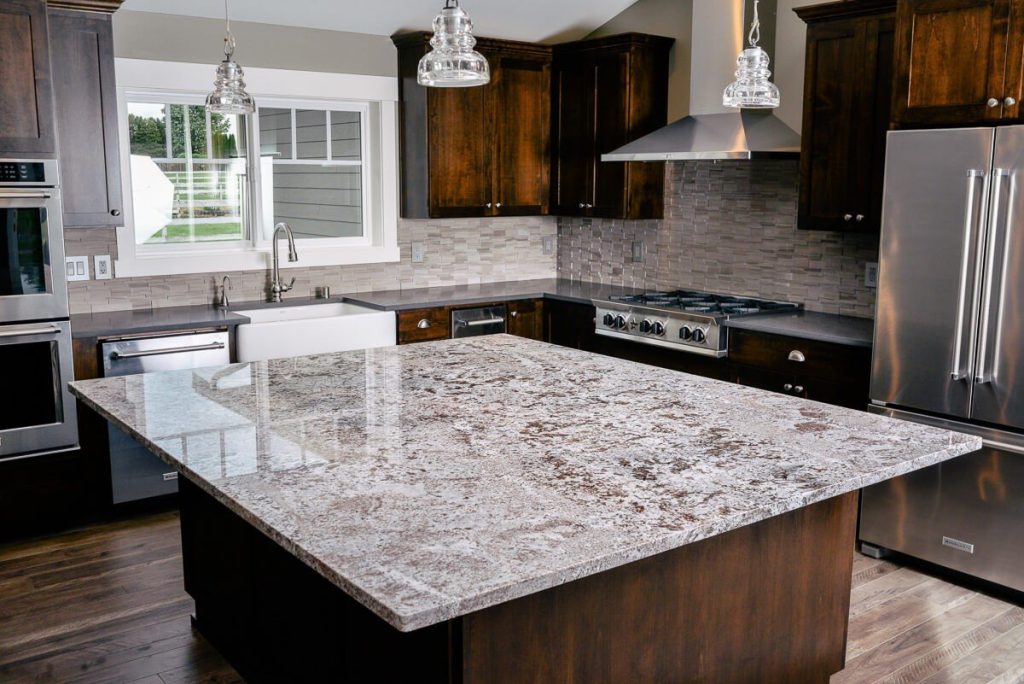Your kitchen countertops are more than just functional surfaces—they are a focal point of your kitchen’s design, helping to set the tone for the entire space. When choosing the best countertop material, you need to consider several factors, including durability, aesthetics, maintenance, and your personal style. With so many options available, selecting the right material can seem overwhelming, but understanding the benefits and drawbacks of each choice can help you make an informed decision.
In this guide, we’ll explore the most popular kitchen countertop materials, their pros and cons, and tips for choosing the best one to suit your needs and preferences.
1. Granite Countertops
Granite has been one of the most popular countertop materials for years, and for good reason. It’s known for its durability, timeless beauty, and high-end appeal. Granite countertops are cut from natural stone, and each slab is unique, giving your kitchen a one-of-a-kind look.
Pros:
- Durability: Granite is extremely hard and can withstand heavy use, including chopping, hot pots, and spills.
- Heat-Resistant: Granite can handle high temperatures, making it ideal for cooking areas.
- Unique Appearance: No two slabs are the same, giving your kitchen a personalized look.
- Resale Value: Granite is a high-end material that can increase the resale value of your home.
Cons:
- Price: Granite countertops tend to be on the pricier side, especially for high-quality slabs.
- Porousness: While granite is relatively resistant to stains, it still requires sealing to prevent liquid absorption.
- Heavy: Granite is a dense material, so it may require extra reinforcement during installation.
Granite is a great choice if you’re looking for durability and an elegant, natural stone look. However, if you’re on a budget or prefer lower maintenance options, you might want to explore other materials.
2. Quartz Countertops
Quartz is an engineered stone made from a mixture of natural quartz and resin. It’s a man-made material, which allows it to be produced in a wide range of colors and patterns. Quartz countertops are known for their durability, ease of maintenance, and sleek, modern appearance.
Pros:
- Durability: Quartz is non-porous, meaning it’s resistant to stains, bacteria, and mold. It’s also very scratch and chip-resistant.
- Low Maintenance: Unlike granite, quartz doesn’t require sealing or special care, making it easier to maintain.
- Variety of Styles: Quartz comes in a wide range of colors and patterns, from solid colors to ones that mimic the appearance of natural stone like marble or granite.
Cons:
- Price: Like granite, quartz can be expensive, though it tends to be more affordable than high-end granite slabs.
- Not Heat-Resistant: Quartz is more susceptible to heat damage than granite. It’s best to use trivets or heat pads to protect the surface from hot pots and pans.
- Can Show Seams: Because quartz is engineered, seams may be visible in larger installations, which can detract from the overall appearance.
Quartz countertops are ideal for homeowners looking for a low-maintenance, durable material that offers a wide variety of design options. If you prefer a modern, clean aesthetic and don’t want the hassle of sealing, quartz is a great choice.
3. Marble Countertops
Marble is a classic, luxurious material that brings elegance and sophistication to any kitchen. While it is often associated with high-end kitchens, it also requires more maintenance than other materials.
Pros:
- Aesthetic Appeal: Marble has a unique, elegant look with distinctive veins that can’t be replicated by other materials.
- Cool Surface: Marble stays cooler than other materials, making it ideal for baking and pastry preparation.
- Increased Value: Marble countertops can elevate the design of your kitchen and increase the resale value of your home.
Cons:
- Porousness: Marble is porous, meaning it can absorb liquids like oil, wine, or coffee, leading to stains. Regular sealing is required to keep it protected.
- Scratches and Dents: Marble is softer than granite and quartz, making it more prone to scratches, chips, and dents.
- High Maintenance: Marble requires regular sealing and care to maintain its appearance. It can also stain more easily than granite or quartz.
If you love the luxury and beauty of natural stone and are willing to maintain it, marble can be an excellent choice. It’s especially well-suited for bakers or those who want a classic look, but it’s not as practical for high-traffic kitchens.
4. Solid Surface (e.g., Corian)
Solid surface countertops, such as Corian, are made from a combination of acrylic, resins, and natural minerals. These countertops are known for their seamless, smooth appearance and versatility.
Pros:
- Seamless Design: Solid surface countertops can be fabricated with no visible seams, giving your kitchen a sleek, modern look.
- Variety of Styles: Solid surfaces come in a range of colors and patterns, including options that mimic natural stone or have unique designs.
- Repairable: Minor scratches and dents can be sanded out, making it easy to restore the surface.
Cons:
- Scratch and Heat Resistance: Solid surface countertops are susceptible to scratches, and heat can damage the surface. It’s best to use cutting boards and trivets.
- Less Durable Than Stone: Solid surface countertops are not as durable as granite, quartz, or marble, and they can show signs of wear over time.
- Cost: While generally less expensive than natural stone, solid surface countertops can still be on the pricier side compared to laminate.
Solid surface countertops are a great choice for those who want a sleek, modern look with low-maintenance care and the ability to easily repair minor damage. However, they’re not as durable as stone materials.
5. Butcher Block Countertops
Butcher block countertops are made from strips of wood that are glued together, creating a warm, rustic look. They’re especially popular in farmhouse-style kitchens.
Pros:
- Natural Look: Butcher block provides a warm, inviting feel to your kitchen, adding natural beauty and texture.
- Cutting Surface: These countertops are perfect for chopping, slicing, and other food preparation tasks.
- Customizable: Butcher block countertops can be customized with different wood types, finishes, and edge styles.
Cons:
- High Maintenance: Butcher block requires regular oiling to maintain its appearance and prevent it from drying out or cracking.
- Prone to Damage: Wood countertops are susceptible to scratches, dents, and water damage if not properly cared for.
- Staining: Butcher block can stain from food, liquids, and oils, particularly if spills are not cleaned promptly.
Butcher block countertops are ideal for those who want a warm, rustic look and are willing to maintain the surface. It’s perfect for people who do a lot of cooking and want an integrated cutting surface.
6. Concrete Countertops
Concrete countertops are highly customizable and can be molded into any shape, making them a unique choice for modern kitchens.
Pros:
- Customization: Concrete can be cast into any shape or size, allowing for highly personalized designs.
- Durability: Concrete is durable and can withstand high temperatures and heavy use.
- Aesthetic Appeal: With its industrial look, concrete offers a modern, minimalist feel that’s popular in contemporary kitchens.
Cons:
- Cracking: Concrete is prone to cracking over time, especially if not properly installed or sealed.
- Staining: Like marble, concrete can stain if not properly sealed.
- High Maintenance: Concrete requires sealing and care to prevent stains and cracks from forming.
Concrete countertops are perfect for those who want a unique, customizable look and are willing to care for their surfaces. They’re best suited for modern kitchens with a minimalist design.
Conclusion
Choosing the right countertop material for your kitchen involves considering factors like your style preferences, budget, and how much maintenance you’re willing to do. Granite and quartz are both durable options that offer timeless appeal, while marble provides a luxurious and elegant look. Solid surfaces like Corian offer sleek, seamless designs, and butcher block brings warmth and natural beauty to the kitchen. If you’re looking for something unique and customizable, concrete countertops may be the perfect fit.
Ultimately, the best countertop for your kitchen depends on your lifestyle and aesthetic preferences. By weighing the pros and cons of each material, you can choose the perfect countertop to suit your kitchen needs and transform the heart of your home.

